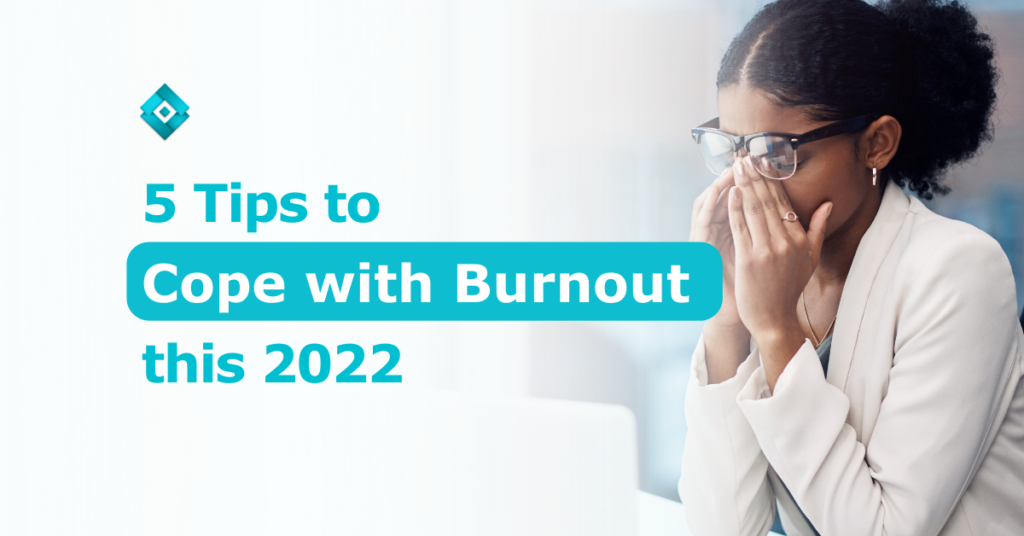Are you having problem coping with burnout at work? If you are, you’re not alone. In a 2021 survey, the result showed that more than half of the respondents are experiencing burnout. 80% of those feeling burnout admitted that the current global pandemic worsened their feelings towards their work. Meanwhile, more than 50% of physicians felt pressure and stress while working.
We cannot avoid being tired of our work, no matter how much we love it. Do not be guilty if you are feeling this way because burnout is a common problem among professionals. In this blog post, we’ll explore what burnout is and share some tips for coping with burnout. So, read on to learn more!
What is burnout?
Burnout is physical or emotional exhaustion. This was explained by Mayo Clinic as a sense of reduced accomplishment and loss of personal identity. In other words, it’s more than just feeling tired. It’s a sense of being completely drained, both physically and emotionally. And it can significantly impact your ability to do your job or meet your responsibilities.
When you’re feeling burnt out, you may feel like you’re running on empty. You may feel irritable, anxious, or even depressed. You may find it challenging to focus or make decisions. You may also start to neglect your physical health. If you’re not careful, burnout can lead to serious health problems. So if you’re starting to feel overwhelmed or exhausted, it’s essential to take steps to prevent burnout before it takes over your life.
What are the signs of burnout?
Mayo Clinic also provided some guidelines to spot burnout:
- Expressing a pessimistic attitude at work
- Struggling to go to work or perform tasks at work
- Feeling exhausted and irritable with the work environment
- Difficulty in concentrating
- Absence of satisfaction in work and achievements
- Using unhealthy coping mechanisms such as overeating, drinking alcohol, or smoking
- Experiencing unexplained physical exhaustion and headaches
How do we handle burnout?
Coping with burnout is not about treating yourself as the enemy or someone you need to tame. The most important thing you can do to cope with burnout and eventually overcome it is to be kind to yourself. After all, we must practice self-compassion, most notably during difficult times.
1. Evaluate your current situation
If you’re coping with burnout, taking a step back and assessing your current situation is essential. Are you working too many hours? Is your job overly demanding? Are you neglecting your personal life in favor of work? Once you’ve identified the source of your burnout, you can start to make changes. If you’re working too many hours, try to cut back and give yourself some more free time. If your job is demanding, see if there are ways to lighten your load. And if you’re neglecting your personal life, make an effort to reconnect with friends and loved ones. By taking stock of your situation, you can start to cope with burnout and get back on track.
2. Reset your views
It is essential to reset your views when coping with burnout. This means looking at the situation differently and trying to see the good in people and situations. Often, when we are burned out, we focus on the negative, and this can lead to further stress and anxiety. Resetting your views means taking a step back and looking at the situation objectively. It may also involve talking to someone who can offer a different perspective. By resetting your views, you will better cope with burnout and reduce stress levels.
3. Practice self-compassion
Everyone experiences feelings of inadequacy, failure, and self-doubt at times. However, when these feelings become pervasive and hinder our ability to cope with day-to-day challenges, they can lead to burnout. One way to prevent or reduce burnout is to practice self-compassion. This means showing yourself the same kindness, understanding, and care that you would offer to a friend. It involves recognizing that we all make mistakes and that we all have days when we feel like we can’t handle everything.
By extending compassion to ourselves, we can cultivate a more forgiving internal dialogue and develop coping strategies for difficult situations. As a result, self-compassion can help us to prevent burnout and live more resilient lives.
4. Do some physical activities.
Taking some time out to do physical activities can help cope with burnout. When we are physically active, our body releases endorphins. Endorphins are hormones that act as natural painkillers and also improve our mood. Exercise also helps to reduce stress by providing a distraction from the things that are causing us stress. Additionally, physical activity can increase our energy levels and allow us to get a better night’s sleep, both of which can be helpful in coping with burnout. So, if you’re feeling overwhelmed, don’t despair—go for a run, take a yoga class, or go for a swim. You may find that it helps more than you think.
5. Do not be afraid to ask for help.
Asking for help can be difficult, especially if you’re used to coping on your own. But sometimes, when you’re feeling overwhelmed and exhausted, it’s the best thing you can do. Coping with burnout is difficult, and it’s essential to have a support system in place. When you’re feeling burnt out, reach out to your friends and family. Please explain how you’re feeling and ask for their help.
They may not be able to solve your problems, but simply talking about what’s going on can be a huge relief. And if you don’t feel comfortable talking to your loved ones, there are always professional assistance options available. Don’t be afraid to ask for help when you need it. It can make all the difference in coping with burnout.
Take a deep breath.
Burnout is a natural and serious issue that can impact your mental health, physical health, and work performance. If you are experiencing burnout, it’s essential to take steps to address the issue before it becomes worse. These five tips should help get you started on the road to recovery. Remember, you’re not alone in this journey; support is available for you if you need it. With Core Virtual Solutions, you can hire highly-qualified virtual assistants to support you or take work tasks off your shoulders. By taking the courage to delegate tasks, you may potentially reduce or get rid of your burnout.








